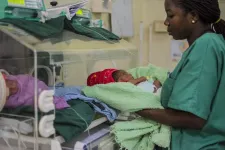(Press-News.org) Inflammasomes make up an intricate system of molecular sensors that our bodies use to sound an alarm when an infection occurs. However, the mechanisms behind these sensors, which initiate responses to threats such as invading pathogens, and how they operate has been an area of intrigue for immunologists.
In a new study, University of California San Diego biologists describe a previously unknown way that the immune system detects certain viruses. The inflammasome immune protein known as CARD8, they found, can serve as a trip wire to detect a range of viruses, including SARS-Cov-2, which causes COVID-19.
Adding a twist to their discovery, researchers led by the School of Biological Sciences’ Matt Daugherty and colleagues at the University of Washington and UC Berkeley, found that CARD8 functions differently among various species and even varies between individuals in the human population. The findings, which resulted from a series of experiments across human cell lines and an analysis of CARD8 genetic variation in mammalian species, are described in the journal PLOS Biology.
“In a version of CARD8, we found that some humans have lost the ability to sense coronavirus infections based on a single genetic difference but have gained the ability to sense viruses in a different family, the enteroviruses—which includes rhinovirus (common cold) and poliovirus,” said Daugherty, an associate professor in the Department of Molecular Biology. “So that means it’s an evolutionary tradeoff and CARD8 diversity in humans impacts which viruses can be sensed and which ones cannot.”
The research team found that the bat version of CARD8 is not able to sense coronaviruses. This could explain how coronaviruses are able to infect bats so easily and become a virus “reservoir.”
The findings provide evidence that CARD8 has evolved substantially across different species of mammals and individual humans. According to the authors, “Our findings establish CARD8 as a rapidly evolving, polymorphic, innate immune sensor of positive-sense RNA viruses.”
Daugherty said researchers have only found the tip of the iceberg in terms of the way immune sensors sound the alarm about pathogens and infection.
“It’s amazing to see this evolutionary balance of one virus to another going from sensing to not sensing—it’s mind-blowing,” said Daugherty.
More studies are needed to thoroughly determine CARD8’s role in the severity of COVID-19 infections and long COVID symptoms.
“It is tempting to speculate that diminished CARD8 inflammasome activation may be a contributing factor to variation in COVID-19 disease outcomes, and more generally for other human pathogenic coronavirus and picornavirus infections,” the authors note.
The research study’s authors include: Brian Tsu, Rimjhim Agarwal, Nandan Gokhale, Jessie Kulsuptrakul, Andrew Ryan, Elizabeth Fay, Lennice Castro, Christopher Beierschmitt, Christina Yap, Elizabeth Turcotte, Sofia Delgado-Rodriguez, Russell Vance, Jennifer Hyde, Ram Savan, Patrick Mitchell and Matthew Daugherty.
— With information from a PLOS Biology news release
END
Researchers find an immune system ‘trip wire’ that detects COVID-19
Certain people have genetically lost the ability to detect coronavirus infections through the newly identified CARD8 sensor
2023-06-08
ELSE PRESS RELEASES FROM THIS DATE:
Without fully implementing net-zero pledges, the world will miss climate goals
2023-06-08
Without more legally binding and well-planned net-zero policies, the world is highly likely to miss key climate targets.
In the new study, led by Imperial College London and published today in Science, researchers ranked 90% of global net-zero greenhouse gas emissions pledges as providing low confidence in their full implementation.
The researchers recommend nations make their targets legally binding and back them up with long-term plans and short-term implementation policies to increase the likelihood of avoiding ...
Breakthrough: Scientists develop artificial molecules that behave like real ones
2023-06-08
Scientists from the Radboud University have developed synthetic molecules that resemble real organic molecules. A collaboration of researchers, led by Alex Khajetoorians and Daniel Wegner, can now simulate the behaviour of real molecules by using artificial molecules. In this way, they can tweak properties of molecules in ways that are normally difficult or unrealistic, and they can understand much better how molecules change.
Emil Sierda, who was in charge of conducting the experiments at Radboud University: ‘A few years ago we had this crazy idea to build a quantum simulator. We wanted to create artificial ...
Global study highlights deaths from neonatal sepsis and steps to improve treatment
2023-06-08
A global observational study co-led by UCL (University College London), which involved more than 3,200 newborn babies suffering from sepsis in 19 hospitals in 11 countries, has shown that many newborns are dying because the antibiotics used to treat sepsis are losing their effectiveness.
The study, conducted from 2018 to 2020, found there was high mortality among infants with culture-positive sepsis (almost 1 in 5 across the hospital sites), and a significant burden of antibiotic resistance. The study has provided a wealth of high-quality data aimed at improving the treatment of newborn babies with sepsis.
The findings of the observational study ...
Why certain fish are left off the hook
2023-06-08
As warming waters threaten fish populations and disrupt fisheries around the world, it is critical to find ways to sustain fisheries while at the same time allowing those fisheries to remain economically viable to those who depend on them for their livelihoods. In the United States, commercial fishing employs 1.2 million Americans and generates more than $165 billion annually.
The primary way that the United States has protected its fisheries is through the Magnuson-Stevens Act, which was modernized in 1996 to foster the long-term biological and economic sustainability ...
In schools that could benefit most, building relationships is key to increasing capacity for nutrition education programming
2023-06-08
Philadelphia, June 8, 2023 – The US Department of Agriculture Supplemental Nutrition Assistance Program-Education (SNAP-Ed) provides nutrition programming to individuals with low income, including students and their families, through a network of community partners who implement the programs. Findings of a new study in the Journal of Nutrition Education and Behavior, published by Elsevier, suggest SNAP-Ed implementers could develop a school’s readiness for programming by concentrating efforts on cultivating relationships, program-specific capacity, and motivation at schools.
Lead author Erin McCrossan, PhD, Office of ...
Study uncovers how B cells react to skin cancer
2023-06-08
A new study that sheds light on how B cells react to skin cancer cells could pave the way for innovative therapy design.
The study, published today in Nature Communications and led by researchers from King’s College London, reveals that antibody-producing B cells in patients may be defective in responding to the most aggressive skin cancer, melanoma.
Antibodies are produced by B cells, a type of white blood cell, and are made to prevent and help fight infections. However, there is limited understanding about how B cells are prompted to respond to melanoma and why the antibodies they make are not effective.
Researchers ...
Universities in California, Arizona, and Nevada form consortium to address clean water access and sustainability challenges
2023-06-08
A novel collaboration between the University of Southern California (USC), the University of Arizona (UA), and the University of Nevada, Reno (UNR), has resulted in the Water Reuse Consortium. This groundbreaking partnership has been awarded a $12.3 million cooperative agreement for phase one of a three-phase $38 million program with ERDC-CERL to tackle pressing water challenges through innovative research, education, communication, and unprecedented collaborative efforts between government, local communities, industry, and academia.
The Water Reuse Consortium brings together ...
Henry Ford Health researchers launch clinical trial studying therapy aimed at causing brain cancer cells to self-destruct
2023-06-08
DETROIT (June 8, 2023) – Researchers in the Hermelin Brain Tumor Center at Henry Ford Health are leading a Phase I clinical trial studying the maximum tolerated dose of an oncolytic adenovirus, a mutated virus engineered to selectively replicate in and destroy cancer tissue, in combination with fractionated stereotactic radiosurgery among patients who are undergoing resection of a recurrent high-grade astrocytoma brain tumor.
“The participants in this study have progressive high-grade astrocytoma as well as glioblastoma, and are scheduled to undergo repeat surgery,” said Tobias ...
Resuscitation after on-field cardiac arrest should start with teammates
2023-06-08
It is well known that early resuscitation with cardiopulmonary resuscitation (CPR) and an automated external defibrillator (AED) saves lives, and in most sports-related sudden cardiac arrest events, trainers or medical personnel respond and initiate protocols to resuscitate a player while other athletes standby. However, time to treatment is critical, so the ability for a fellow athlete to recognize sports-related sudden cardiac arrest and initiate resuscitation while medical personnel arrive is crucial in a life-threatening event where seconds matter. However, in a new study presented at the American ...
Place of death from cancer in US states with vs without palliative care laws
2023-06-08
About The Study: The results of this study suggest that state palliative care laws are associated with an increase in the likelihood of dying at home or in hospice among decedents from cancer. Passage of state palliative care legislation may be an effective policy intervention to increase the number of seriously ill patients who experience their death in such locations.
Authors: May Hua, M.D, M.S., of the Columbia University College of Physicians and Surgeons in New York, is the corresponding author.
To access the embargoed study: Visit our For ...
LAST 30 PRESS RELEASES:
DEGU debuts with better AI predictions and explanations
‘Giant superatoms’ unlock a new toolbox for quantum computers
Jeonbuk National University researchers explore metal oxide electrodes as a new frontier in electrochemical microplastic detection
Cannabis: What is the profile of adults at low risk of dependence?
Medical and materials innovations of two women engineers recognized by Sony and Nature
Blood test “clocks” predict when Alzheimer’s symptoms will start
Second pregnancy uniquely alters the female brain
Study shows low-field MRI is feasible for breast screening
Nanodevice produces continuous electricity from evaporation
Call me invasive: New evidence confirms the status of the giant Asian mantis in Europe
Scientists discover a key mechanism regulating how oxytocin is released in the mouse brain
Public and patient involvement in research is a balancing act of power
Scientists discover “bacterial constipation,” a new disease caused by gut-drying bacteria
DGIST identifies “magic blueprint” for converting carbon dioxide into resources through atom-level catalyst design
COVID-19 vaccination during pregnancy may help prevent preeclampsia
Menopausal hormone therapy not linked to increased risk of death
Chronic shortage of family doctors in England, reveals BMJ analysis
Booster jabs reduce the risks of COVID-19 deaths, study finds
Screening increases survival rate for stage IV breast cancer by 60%
ACC announces inaugural fellow for the Thad and Gerry Waites Rural Cardiovascular Research Fellowship
University of Oklahoma researchers develop durable hybrid materials for faster radiation detection
Medicaid disenrollment spikes at age 19, study finds
Turning agricultural waste into advanced materials: Review highlights how torrefaction could power a sustainable carbon future
New study warns emerging pollutants in livestock and aquaculture waste may threaten ecosystems and public health
Integrated rice–aquatic farming systems may hold the key to smarter nitrogen use and lower agricultural emissions
Hope for global banana farming in genetic discovery
Mirror image pheromones help beetles swipe right
Prenatal lead exposure related to worse cognitive function in adults
Research alert: Understanding substance use across the full spectrum of sexual identity
Pekingese, Shih Tzu and Staffordshire Bull Terrier among twelve dog breeds at risk of serious breathing condition
[Press-News.org] Researchers find an immune system ‘trip wire’ that detects COVID-19Certain people have genetically lost the ability to detect coronavirus infections through the newly identified CARD8 sensor

